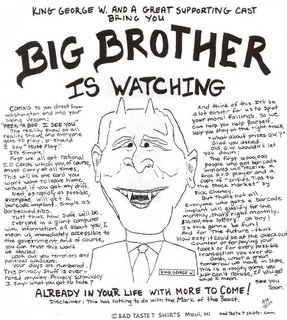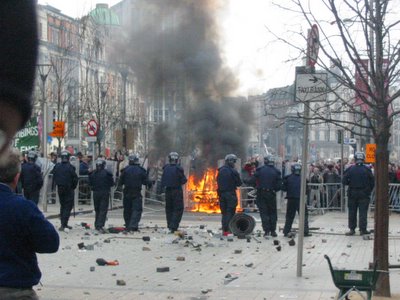
Like the majority of Irish people, I was embarrassed by what happened at the 'Love Ulster' march last Saturday and was ashamed to call myself Irish that day. The protest was hijacked by skangers and political and historical illiterates, whose Christmases all came in one, giving them the perfect opportunity to cause mayhem. International news coverage, as always, decontextualised the dispute and filed the conflagration under the resurrected title of 'Nationalists vs Unionists'.
The riots that ensued told us many things about the Ireland we live in today.
We were all so smug in the build-up to the march. We sat back with self-satisfied grins on our faces that seemed to say 'look how politically mature we are?' and 'See how things have normalised here?' We didn't even consider that elements of Dublin city were planning to use the event to unleash chaos on the streets.
Why? My guess is that we all assumed that the people who did eventually unleash all that chaos were apolitical and totally disengaged from the political process. They would carry on with whatever it is they do and the march would be over before we know it.
I think that claim is true. But this riot, at its heart, had nothing - and everything - to do with politics. In one sense, it was just an excuse to riot, loot and attack members of Ireland’s security forces and media figures. However, a cursory survey of some of the tribal, ‘catch-cry of a clown’ phrases and chants spouted during the clashes exposed the perverted, warped and dangerously misinformed version of history that these people seem to subscribe to. Where those opinions originate from is hard to pinpoint but the first witness I’d call is an education system that seems to have utterly failed to cultivate a rounded, multi-facetted approach to the teaching and learning about our past.
Our history and the very nature of the circumstances in which Ireland became a State have been subject to intense scrutiny and debate lately. There is no clear argument and all sides make interesting points. Our relationship with revolution and the concept of 'blood sacrifice' is at the heart of this debate. Should we be ashamed of 1916 or should we embrace it? Were the signatories of the 1916 Proclamation - whom I would like all those rioters to name for me since they seem to mean so much to them - terrorists or freedom-fighters? Should we reinstate the Easter military parade to commemorate the Rising or does that send out a repugnant and inappropriate message in today's volatile political and cultural climate?
These are difficult questions but they are just the tip of the iceberg for a country that has never come to terms with its origins and never engaged in national debate and self-reflection. If everything seems confused and chaotic and, at times even surreal at, don’t panic, because it's always been that way. Civil War in the North and decades of near-economic bankruptcy dominated and distracted national discourse up until now. This is the first time in our history that we have the space and time with which to deal with the questions of who and what we are as a nation – but it may be too late for that.
The government wants to reclaim an interpretation of 1916 from Sinn Fein-IRA in order to curtail – or perhaps, cash-in on - their political and electoral momentum before next year's (?) general election. But how can you explain that momentum in the first place? This is an organisation who is elected to a democratic parliament that they don't officially recognise of a state (i.e. the Republic) that they don't officially recognise. We know full well of that organisation's ties to crime and criminality, murder, punishment beatings, bank robberies and money laundering. They undoubtedly stoked tensions in the build-up to the parade last Saturday.
And yet, Sinn Fein-IRA will probably top the poll in many constituencies in the next election. Bertie et al are right to be worried - but the rise and/or regeneration of this republican movement is largely the fault of our established political parties. The standard of public representation must be so abysmal that people are willing to give the most precious thing that exists in a democracy - the vote - to the likes of Sinn Fein-IRA rather than to Fianna Fáil, Fine Gael, Labour or the PDs.
This is a political establishment that has remained purposefully vague about the very legitimacy of the Irish republic, allowing a vacuum to develop that was going to be filled by someone with the braggadocio to come out publicly with some sort of ideology, regardless of how dangerous that might be.
What do I mean by that? For instance, instead of trying to appear like Sinn Fein by claiming back 1916 - the Irish equivalent of the Taoiseach donning a military uniform like George W Bush did to announce the 'end' of the Iraq war three years ago - why doesn't the government hold a parade to commemorate the Republic of Ireland Act? That Act came into effect on 18 April 1949 and the state has been known as the Republic of Ireland since then.
But no. That's something else we have to be ashamed of on top of 1916. It was the Inter-Party government with a Fine Gael Taoiseach that proclaimed the Republic. Fianna Fáil opposed it at the time as they deemed it unnecessary: they argued, disingenuously, that DeValera's 1937 Constitution declared the Republic in all but name and so they saw the 1949 Act as serving no purpose. What they really meant was that (a) we refuse to be upstaged as republicans by Fine Gael and (b) we will not offically endorse a 26 county republic.
Fianna Fáil have been in power for 40 of the 57 years that have elapsed since then and it appears as if they have refused to change their original view of the 1949 Act in the meantime. Otherwise, as the most dominant political party in any Western democracy since WWII, what's stopping them from marking out 18 April as the Republic Day?
Because, like Sinn Fein, they still cling to some half-arsed notion of All-Ireland Unification, a process that appears to be a long-way off if last Saturday is anything to go by. Don't get me wrong; the alternative governments in the interim - the Inter-Party governments of 1948-1951, 1951 - 1957, the Fine Gael-Labour coalitions of 1973-1977 and 1982-1987 and the Rainbow Government 1994-1997 - could have done likewise. All of them are afraid to officially and permanently institutionalise and acclaim the Republic of Ireland Act lest they be cast as bad republicans.
They ARE bad republicans already. We have no Republic Day. In fact, I'd bet that the majority of Irish people - and that includes the members of the cabinet and Dáil Eireann - don't even know the date and year that Ireland was proclaimed a Republic. We have no Constitution Day, no EU Accession Day - all major events in the development of this Republic, wouldn't you think?
No, our political leaders have been happy to treat the Republic of Ireland as, at best, some kind of booby prize and, at worst, an illegitimate state - or to borrow a phrase from a former Fianna Fáil Taoiseach Albert Reynolds, "a temporary little arrangement". If we have no sense of permanency or pride about our very State, not to mention its many historical and political intricacies - is it any wonder that criminal organisations and yobs can swoop in with a perverted sense of Irish-ness and republicanism and unleash chaos?
You might not agree with my drawing together strands as seemingly diverse as the Republic of Ireland Act 1949 and the riots of February 2006. But there is a link. This country, fundamentally, does not know what it is or what we stand for. Maybe it’s a post-colonial thing – another aspect of our history and culture we have to get to grips with – or maybe it’s the result of hysterical and over-zealous political posturing for the last 100 years.
For example, Ireland is a country with a constitutionally inscribed first language – which hardly anyone can speak. There is a small scale, fashionable (i.e. middle-class) movement to resurrect it by way of Gaelscoileanna and glamourous advertising campaigns. But it is not, and has not, been the language of Irish life or popular culture, indeed of the Irish soul, for nearly 150 years. The vast majority of us can’t speak it – something else to feel guilty about. We don’t converse, gossip, argue, sing or dream in the language. We don’t seduce with it, don’t use it in the work place or in our homes. We don’t want to hear it as the means of our filmic and television entertainment. Irish today is more like a hobby or a museum relic – not a constitutional first language.
But, no. The Irish language – the repository of so much negative memories for most of us – was as imposed on this state after Independence as English was in the nineteenth century. The linguistic Gaelic revival failed. But the State has clung to it ever since, resulting in the creation of a kind of schizophrenic identity whereby proudly using the language you are born into (i.e. English) is hypocritically tainted as a form of historical and cultural betrayal and even inferiority.
Just last week, a mini-storm blew up over the fact that the majority of the Irish people can’t sing along to our national anthem – because it is in Irish. Another thing to feel guilty about folks. So not only can we not converse in the language that we were told is the only true expression of the Irish soul, we can’t join in the public celebration of national pride – all because of an unrealistic, failed language policy.
We are all over the place, historically and culturally. As stated earlier, this is really the first time in history where war or poverty is not the main preoccupations of the national consciousness. But those deep traumas from our past have left indelible marks. We are war-weary, complacent about the North, sick of it, in all honesty.
Money has also been a double-edged sword. This is an old argument: all the Celtic Tiger clichés are back to haunt us but they merit repeating. Yes, we are all – theoretically – better off than ever before. Yes, we’ve had a great run of it over the past 12 years. We had just been let out of the strict, puritanical boarding school of the 1980s and let loose in the fin-de siecle 1990s university, where endless partying and consumerism were the most popular courses on offer.
And we were bought off. We have become complacent. The next election will – is - being fought on economic issues. It’s all that really concerns us now. It’s of no matter that our very being as a state, as a nation, as a culture is in dire need of examination.
Of course, by ‘we’ and ‘us’, I mean middle-Ireland – because last Saturday also showed us once and for all that there is a class-war in post-Celtic Tiger Ireland. As the rising tide lifted so many boats, a lot of passengers fell overboard and have not been able to get back on board since. It has created gross divisions and inequalities – financially, socially, and educationally – that are just storing up problems for the future. We know all this already: well the future is here folks.
Those last three paragraphs are SO 2001. We live in post-Celtic Tiger Ireland now – when the rush is calming, when the party is creeping towards dawn and that hangover is on the way. Now is the time for the really tough decisions, when we need real ideas and vision, qualities that - and I think you’ll agree with me here - are missing in abundance in our political establishment today.
What happened last Saturday served as a visible signpost pointing to far deeper problems within the Irish nation. The riots struck at the heart of far-reaching failings in our cultural, intellectual and social experiment of the last 80 years. Martin Luther King said that ‘a riot is the language of the unheard’. What were these rioters trying to tell us by their loaded words, their actions, their very existence in the first place?
If all the disparate forces discussed above that fed into last Saturday’s violence were unheard before, we’ve certainly heard them now.
We’ve heard – but is anybody really listening?
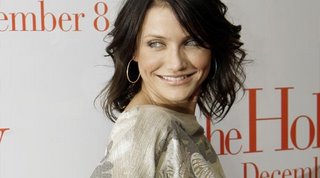




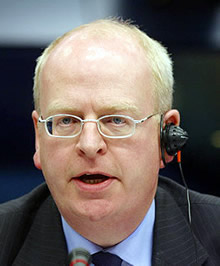





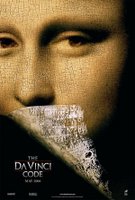
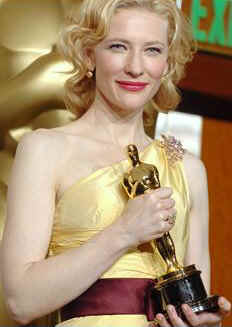 Cate Blanchett to play Dylan in biopic
Cate Blanchett to play Dylan in biopic I attended an advanced screening of Paul Greengrass' controversial new movie 'United 93' last night and all I can say is that the early rave reviews from American critics are well deserved.
I attended an advanced screening of Paul Greengrass' controversial new movie 'United 93' last night and all I can say is that the early rave reviews from American critics are well deserved.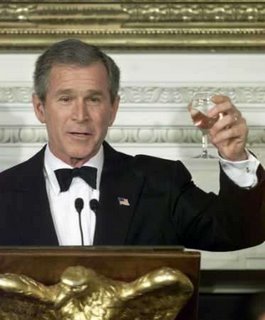
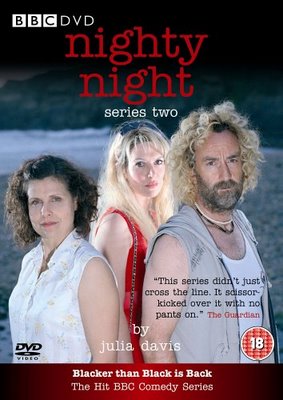

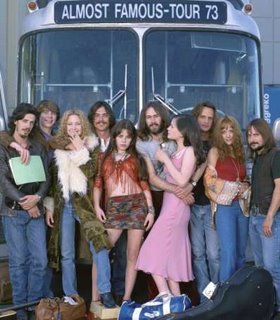

 From the Telegraph. So this is the threat to world peace that Bush and Blair were so worried about?
From the Telegraph. So this is the threat to world peace that Bush and Blair were so worried about?
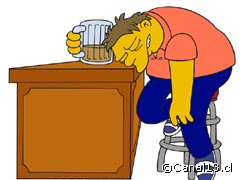





 It's a good thing that I didn't head off to bed after the announcement that Ang Lee had won Best Director for 'Brokeback Mountain'. Having sat through four hours of an interminably predictable and lifeless ceremony - exacerbated by Sky's segues to the abysmally clueless Mariella Frostrup - everything seemed to be going according to plan. All of the expected winners - deservedly in the vast majority of cases - had been to the podium to claim their prizes. 'Brokeback' was on the way to capping its incredible year by taking home Hollywood's top honour.
It's a good thing that I didn't head off to bed after the announcement that Ang Lee had won Best Director for 'Brokeback Mountain'. Having sat through four hours of an interminably predictable and lifeless ceremony - exacerbated by Sky's segues to the abysmally clueless Mariella Frostrup - everything seemed to be going according to plan. All of the expected winners - deservedly in the vast majority of cases - had been to the podium to claim their prizes. 'Brokeback' was on the way to capping its incredible year by taking home Hollywood's top honour. And so the long campaign is over. The winners of the 78th Annual Academy Awards are announced Sunday night in LA, which means that viewers on this side of the pond will have to stay up until the wee hours to watch the whole orgy of self-congratulation live on Sky Movies.
And so the long campaign is over. The winners of the 78th Annual Academy Awards are announced Sunday night in LA, which means that viewers on this side of the pond will have to stay up until the wee hours to watch the whole orgy of self-congratulation live on Sky Movies. Like the majority of Irish people, I was embarrassed by what happened at the 'Love Ulster' march last Saturday and was ashamed to call myself Irish that day. The protest was hijacked by skangers and political and historical illiterates, whose Christmases all came in one, giving them the perfect opportunity to cause mayhem. International news coverage, as always, decontextualised the dispute and filed the conflagration under the resurrected title of 'Nationalists vs Unionists'.
Like the majority of Irish people, I was embarrassed by what happened at the 'Love Ulster' march last Saturday and was ashamed to call myself Irish that day. The protest was hijacked by skangers and political and historical illiterates, whose Christmases all came in one, giving them the perfect opportunity to cause mayhem. International news coverage, as always, decontextualised the dispute and filed the conflagration under the resurrected title of 'Nationalists vs Unionists'.